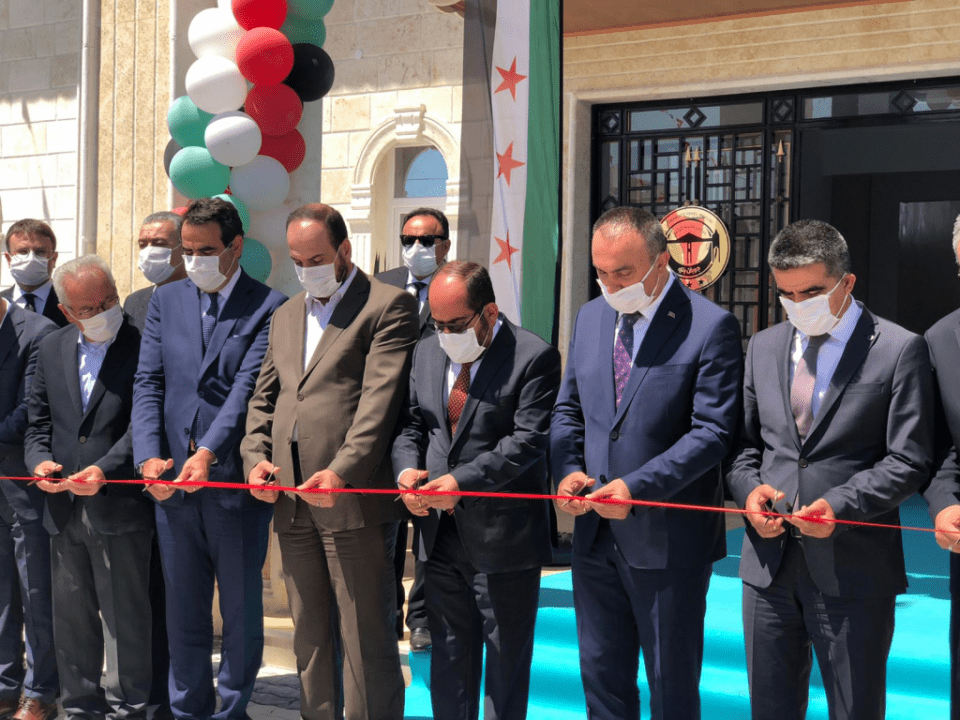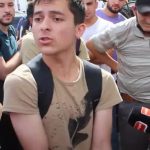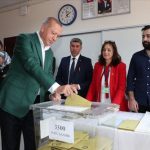Twelve years after the outbreak of the Syrian revolution, official opposition institutions remain dependent, not only politically and militarily, but in the provision of services. The Syrian Interim Government (SIG), represented by its service institutions in the northern Aleppo countryside, is not only supported by Turkey, but subordinate to it in administering opposition-held territories.
Dependence begins
In the northern Aleppo countryside, as Ankara-backed opposition factions took control of the area, expelled the Islamic State (IS) in the 2016 Operation Euphrates Shield and drove the Syrian Democratic Forces (SDF) out of Afrin in the 2018 Operation Olive Branch, newly established local councils were linked administratively to Turkish provinces. Each emerging council in Syria was tied to a corresponding province on the other side of the border.
On this basis, the opposition-held area was divided administratively between three Turkish provinces: Gaziantep, Urfa and Kilis. A Turkish General Coordinator was appointed for each area—those taken with Turkish support in Operation Euphrates Shield as well as Operation Olive Branch—with additional sub-coordinators for the main cities, towns and districts.
These coordinators are responsible for the primary service sectors, and report to the general coordinators, who in turn report to each responsible Turkish governor, according to Manaf Quman, a researcher at the Omran Center for Strategic Studies whose work focuses on early recovery in opposition areas of northern Aleppo.
The current dependency of opposition institutions on Turkey is “an integral link, not only formal,” Quman told Syria Direct. “Local councils cannot make a decision on strategic matters without consulting the Turkish governor.” This includes deciding to replace the Syrian national currency for Turkish lira, attracting significant financial support, opening an industrial area or establishing a vegetable market, all of which “require greater coordination with the governor,” he added.
Turkish authorities have not intervened “coarsely” in opposition areas, “with the exception of Afrin,” Quman said. Ankara has left the freedom of electing local councils to Syrians, but once elected “the council is compelled to work with the Turkish governor to push through services and projects.”
A political science researcher originally from the Aleppo countryside but currently living in Turkey, who requested anonymity for security reasons, agreed with Quman’s reading. The process of attaching opposition service institutions to Turkish provinces gave the latter “the authority to follow up on all files, and gave Turkish institutions in [each] province the authority to manage issues on the Syrian side, according to their specialty in health, education, security and others,” he told Syria Direct.
Turkey did not impose control over the local councils by force, but “restricted the work of organizations and financial channels, forcing them to work with Turkey’s [Disaster and Emergency Management Authority] AFAD, through which they controlled the councils’ work,” the researcher said. With that, each council came to “belong to the corresponding Turkish province in all its institutions,” including security, police, health, education and electricity.”
What does it mean to be dependent?
At the end of February, a group of Syrian lawyers protested in front of the courthouse in the eastern Aleppo countryside city of al-Rai. They decried what they called “the interference of the Turkish judicial coordinator in judicial affairs,” as well as in the work of the Free Syrian Lawyers Association, in his oversight of documents related to the work of lawyers and judicial agencies.
“The Turkish coordinator is the supreme judicial authority, in administrative and judicial terms, in many cases,” said lawyer Yusuf al-Hussein. For example, “fines are determined through the coordinators, and are exorbitant.”
The coordinator often intervenes “even in judicial rulings and their implementation, which has harmed the judiciary in our liberated areas,” al-Hussein said. The presence of multiple coordinators in multiple areas is “an even greater harm, because each coordinator’s work differs from the other,” he added.
“We are always calling for judicial independence, for the formation of a supreme judicial council to be the sole judicial authority,” he added. “Unfortunately, this has not happened due to the poor administration of the area by the Turks.”
The shape of local councils’ dependency, and their relationship with Turkey, varies from one council to another. But it is at its highest in the Afrin area, a sensitive area for Turkey given its Kurdish majority, four sources told Syria Direct.
The educational sector is no less subordinate to Turkey than others, and perhaps more so. “Turkey pays great attention to this issue, and the Syrian education directorates have been fully attached to those in Turkey since the [Syrian] National Army [SNA] and Turkish forces took control of the area. Turkish coordinators have been appointed to follow this file,” said Sami Dureid, a former teacher in the Afrin area who was displaced from south Damascus in 2018.
Last November, sit-ins held by teachers in northern Aleppo ended without achieving any of their demands after the protests were suspended by the opposition-affiliated Free Syrian Teachers’ Union. The teachers were calling for better salaries, and for the educational process in schools to be developed. In the city of al-Bab, the civil police intervened to forcibly remove the protest tent 24 hours after it was erected, and some teachers were threatened with losing their jobs.
Two years ago, Dureid resigned from his job as a teacher at a school in Afrin following a confrontation between him and the Turkish coordinator. The latter had asked Dureid to delete a Facebook post he made criticizing education management, and threatened to fire him.
“The Interim Government has repeatedly tried to manage education, but according to one of my colleagues—who is an official at the SIG Ministry of Education—Turkey did not allow them to intervene in this file,” Dureid said. “Sometimes, the Ministry is not invited to [Turkish] meetings discussing education.”
Turkey runs the educational process in its areas of influence in the northern Aleppo countryside almost completely, including setting the dates of exams and deciding on the curriculum, Dureid said. Test questions for ninth-grade and public high school baccalaureate exams “come from Turkey, and after the test the papers are placed in a box, sealed and sent for grading there. We only receive the results,” he added. As a result, students cannot object to their test scores because “the papers are in Turkey.”
The Turkish education coordinator in Afrin has also prevented the establishment of a teachers’ union in Afrin, calling it a “political act,” according to Dureid. Teachers have also been compelled to “sign volunteer work contracts, which contain clauses that prevent us from participating in any demonstration or any form of objection and protest against any party, whether the Syrian regime or others,” he added, likening the contracts to “a promise” because they “only include one party: the teacher.”
In this context, researcher Quman said “Ankara intervened decisively in specific sectors, especially health and education, as the Turkish ministries intervened in schools and hospitals, developing a system controlling education and connecting hospitals with one another.”
Dependence on Turkey also extends to the military police in the northern Aleppo countryside. “There are Turkish brothers who are advisers for the revolutionary institutions. This is not hidden, it is to exchange security information between us and them, and provide logistical support for security,” a commanding officer in the military police told Syria Direct, requesting anonymity because he is not authorized to speak to the media.
Turkish security advisers have “the authority to remove corrupt people from their positions,” the officer said. But “it is a matter of luck—if the adviser is good, we can reason with him. If not, we are forced to deal with him. This is the reality, and we have no alternative.”
Surface-level government
On March 18, 2013, the National Coalition of Syrian Revolution and Opposition Forces, as the highest official opposition authority, announced the formation of the SIG to administer areas outside regime control throughout the country. But as time went by, the areas belonging to the opposition shrank, especially following the 2018 settlement agreements that ended in Damascus taking control of southern Syria and opposition areas in south Damascus and its countryside.
The SIG’s influence is now limited to Ankara-supported areas of the northern Aleppo countryside. Meanwhile, areas controlled by Hayat Tahrir al-Sham (HTS) in Idlib and parts of Aleppo and Latakia provinces are controlled by the Syrian Salvation Government (SSG), the civilian wing of HTS.
But in the areas still under SIG administration, the de facto government is absent, appearing in an “honorary role” in some official ceremonies and project launches through the attendance of President Abdurrahman Mustafa, who lives in Turkey, Quman said. Three other sources Syria Direct spoke to also described the SIG’s role as a formality.
“The SIG is trying to govern the area, but without unified financial management, its role will remain weak,” Quman added.
While the management of local councils and local entities belonging to the SIG Ministry of Local Administration through elections, “their coordination is tied to the Turkish governor, not the SIG,” Quman said. This has led to “the absence of the SIG, to the extent that the councils make some decisions the SIG only hears about through the media.” He noted that “the local councils are stronger than the SIG, which lacks financial and security control.”
In practice, a handful of key actors administer northern Aleppo: “The local councils, theoretically affiliated with the SIG, and in practice with three Turkish governors, depending on the area; the governors who work separately, each according to his vision and what he deems fit; military factions controlling internal and external crossings; and active organizations that have projects, budgets and communication channels,” Quman said. The latter are “the real actors, in terms of the money they bring in.”
This situation, a “combination of governance consisting of four main actors, makes each local council decide on its own and adopt policies that are different from other councils,” he added. For example, bread might be subsidized in one area, while subsidized to a lesser degree, or not at all, somewhere else.
For electricity, each local council has signed its own supply agreement “in isolation from the other councils, a different agreement with the same company,” Quman said. For example, “the local council in Azaz city signed an agreement to supply it with electricity from a [Turkish] company. After that, the local council in the town of Marea—which belongs administratively to Azaz—signed a different agreement” with the same company.
Last year, areas controlled by the Turkish-backed opposition saw popular protests following a price increase by the company supplying electricity. In Afrin, the protests reached the point that the local council building and that of the electricity company were burned in June 2022.
“The tender to provide electricity to the city took place in Hatay, Turkey,” lawyer Muhammad Haj Abdo, the head of the legal office in the Afrin Local Council, said. The project was proposed there, then “a copy of the contract came to the local council to sign off on,” he added. “The council did not set the terms,” as was the case for internet service.
Decentralized decisions
In theory, SNA-controlled territories are subject to Turkish influence. But the administration of these areas is not centralized. A Turkish coordinator in one region does not necessarily have to go along with a measure implemented in another area within Ankara’s sphere of influence.
For example, “the Turkish coordinator in Afrin agreed to issue a special card for Palestinian Syrians, while the coordinator in Azaz refused to issue the same card,” a Syrian journalist in Afrin told Syria Direct, requesting anonymity for security reasons.
“The relationship between the Turkish provinces themselves impacts the relationship between Syrian local councils, and between the councils and the SIG,” Haj Abdo, of the Afrin Local Council, said.
“Turkish coordinators do not make any written decision, do not sign any document, but rather present a certain idea or directive orally,” he added. This “creates a space of freedom to operate” for the local councils. Some receive directives and do not adhere to them literally, while others “worship these instructions” and implement them literally.
At times, the personality of each Turkish coordinator plays a role. “Some give you independence, and visit you once a month. Others are present on a daily basis, as if they were a body of the institution,” Haj Abdo said.
Consequences of dependence
The Syrian opposition has lost its sovereign role in northwestern Syria, even in terms of service provision. But despite the disadvantages of being dependent on Turkey, this state has “contributed somewhat to achieving financial and security control of the area,” Quman said, as well as “a quantitative shift in water, electricity and transportation services.” In his view, services would be better “if Turkish intervention had been greater.”
But Ankara’s management can also be a roadblock. For example, anyone wishing to provide assistance to camps in the northern Aleppo countryside has to coordinate with Turkey’s AFAD, which “prevents the work of any party without this coordination,” the political science researcher in Turkey said.
He cited his own attempt to enter a camp in northern Aleppo, while working with a Syrian medical organization, to treat tuberculosis patients. The camp’s director, a Turkish national, “asked for information about the team, then contacted the health directorate in Turkey responsible for the area and told us the organization had to go to the directorate before working in the camp.”
AFAD, whose consent is necessary to work in Turkish areas of influence, “was absent from the scene in the first 20 days after the earthquake” that struck southern Turkey and northern Syria on February 6, a Syrian journalist living in a north Aleppo camp said. “This absence caused poor coordination between local organizations working on the ground in the area, since AFAD is the one that directs their teams’ work.”
The journalist, who requested anonymity for security reasons, said that in the camp where he lives, “there is an AFAD administration that includes two or three Turks, and nobody can live in or leave the camp without their consent.”
Other areas also suffer from a lack of centralized governance. The SIG’s General Organization for Seed Multiplication (GOSM) is responsible for managing wheat and flour in the area, but “due to poor coordination—or lack thereof—it flour sometimes runs out, because the local councils import flour on their own or work with [another] organization or entity to obtain it,” Quman said.
Arbitrary administration and services in SIG-controlled areas has also become an excuse for wrongdoers in the area, Haj Abdo said. “An employee could make a mistake in his work and blame it on the Turkish coordinator, and therefore offend the Turkish side and implicate the institutions in errors. This also applies to corrupt people.”
For that reason, there should be “written decisions, and good governance,” Haj Abdo said. “Without that, we will demolish institutions rather than build them, and find ourselves faced with greater misfortunes.”
Most seriously, a lack of centralized governance “creates differentiation in distributing projects among the local councils in the area,” researcher Quman said. He pointed to “the city of al-Bab receiving the largest share of projects, due to its population density and the activity of the Turkish governor responsible for it, as well as the nature of the people and traders in the city.”
This differentiation “plays a role in how cities are formed in the new Syria,” Quman said. “Some small towns and villages have turned into large cities and commercial centers at the expense of other cities and towns,” due to “a failure of governance and the absence of a governing body to write budgets, prepare national plans and manage decision-making from the bottom up.”
**
By: Walid Al Nofal
This report was originally published in Arabic and translated into English by Mateo Nelson.
Source:Syria Direct



